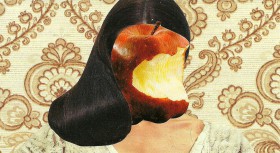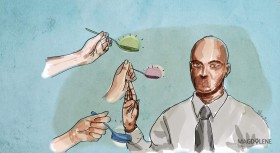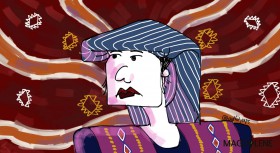I was called a banci (sissy – or fag?) as early as eleven. Certainly I was and am whiny. Certainly I was and am a mama’s boy. But I didn’t use the stereotypical flapping hand gestures and I didn’t want to marry Joe McIntyre. So what made them call me a banci?
When Indonesians talk about banci, they usually refer to the cross-dressing men on parks, streets, or television shows. But when a person tells a man that he’s gay or a banci, he or she (later on, some girls also called me banci) normally is not referring to the man’s sexual preference. Rather it is an act to belittle his manhood.
This has led to a big question for me – but not what if I were gay, rather, what if I were a girl. The dices rolling inside my mother’s body resulted in “XY” and so I came out male. My childhood toys and heroes were very boyish: Batman and Bart Simpson, Kevin McCallister and the A-Team. At ten I thought girls were noisy and nosy.
It was in junior high when I had the first idea of “what if I were a girl?” So maybe I wouldn’t get bullied anymore. So maybe I would not be expected to “man up”. So maybe my floppy actions in the gym would be more tolerated. So I wouldn’t be called a banci. So maybe the girls would be nicer to me.
Of course, I did not know that girl-on-girl bullying could be harsher and meaner – and more prolonged. I did not know that boy-on-girl bullying could be terrifying. I did not know that teenage girls had to deal with sexual objectification every day, from male classmates who think themselves funny, teachers who think they’re only being friendly, and strangers who think it’s their privilege. I did not know that just as other boys would call me banci, a girl could be called a slut or “lesbo” by other girls.
I still don’t know how terrified my classmates could have been during the May 98 riots, when many ethnic Chinese women in parts of Jakarta were reportedly gang raped. While my biggest fear in those days was getting beat up or robbed by some random people in the street, my female classmates had to deal with the real threat of rape and murder in their own homes.
In Australia I entered an interesting world. Different kinds of sexualities are widely accepted, and yet Asian men are stereotyped, not necessarily as gay, but for being effeminate. Certainly when I listened to Japanese rock, I was a bit puzzled with the make-up and the smooth faces, and how these pretty guys made Japanese girls went nuts.
I was just as baffled by the popularity of the similarly styled F4 Taiwanese boyband in Asia at the time. American and British boybands also had to deal with the “gay” label (and some ex-members did come out in later years), but I am still not sure what makes Asian boybands, and by extension, Asian men, look more feminine than their Western counterparts.
In university I hung out with girls, and once I heard one of them ask the others if Mario was gay. The answer was no. He’s just into cute stuff: my backpack was full of anime-related key chains and pins. As with the boybands, what’s mainstream for Asians could be ‘gay’ for Westerners.
The thought entered my mind again when my bestie said I would have looked cute if I were a woman. This is a thought I could actually entertain. I thought no girl or woman in Indonesia or Australia found me attractive, so things would have been different if I were a girl. Of course, the caveat was it would be men who find me attractive, and I couldn’t see myself being attracted to them. And, certainly, being an Asian woman in a Western society is not easier than being an Asian man. My friend told me she had been pushed and yelled at by Western women she never met before.
The last ordeal took place two years ago, when I became the only male English teacher at one school. I was ready to be promoted to become a full-time staff and would be working with about a dozen women. The office asked me repeatedly if I had a problem working with women and I told them I was fine. In the end, the office (i.e. its male executives) cancelled the promotion, saying they were not ready to employ a man.
It seemed like reverse gender discrimination. So if I were a girl, I could get the job? I still could only speculate on the real reason. Certainly the executives wouldn’t really care about office drama. Fear of a sexual harassment claim was a possibility, but that’s hardly a concern in Asian business mindset. Did they worry that they would have to pay me more since I am male? Did they fear that I was gay? Had they received complaints from clients who thought that I was gay? So I simply cannot teach English because I’m male?
If I were a girl, teaching could have its own problems. My otherwise nice supervisor and co-workers might not hold back in criticizing my performance. Male students who sought problems with me might have used sexist taunts or threats. Female students who were fine with me as a man might have been less friendly.
And on top of that? If I were a girl, I believe I would be a lesbian. I simply have no romantic and sexual interest on male. Life would have been even more complicated, bittersweet, and difficult as I attempted to court a girlfriend or to go through the complex communal and social politics. Though some countries (like Singapore) give breathing space for gay women while punishing gay men, in general most societies accept gay men better than gay women (it has to do with male sexual competition).
If I were a girl, I would come out. My family would accept it, but it wouldn’t be easy for everyone. I might still not be able to secure the teaching job; I would still be awkward in front of an attractive woman. And my relationships with female friends would be trickier than they are now.
The positive thing is I could sympathize better with women and gay people. I could have been them.








Comments